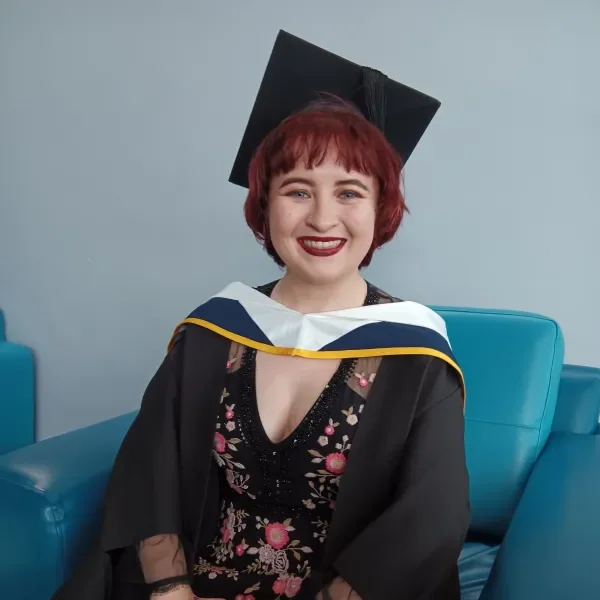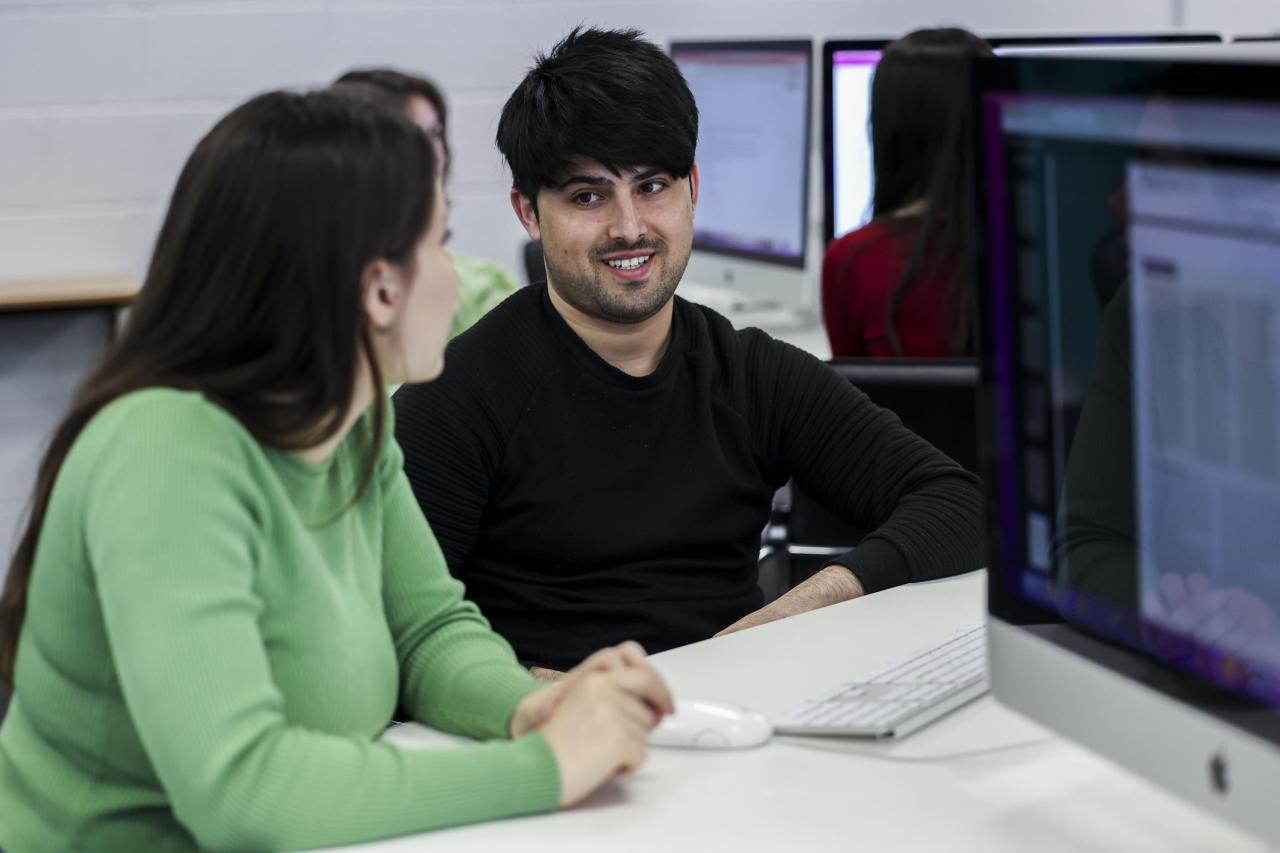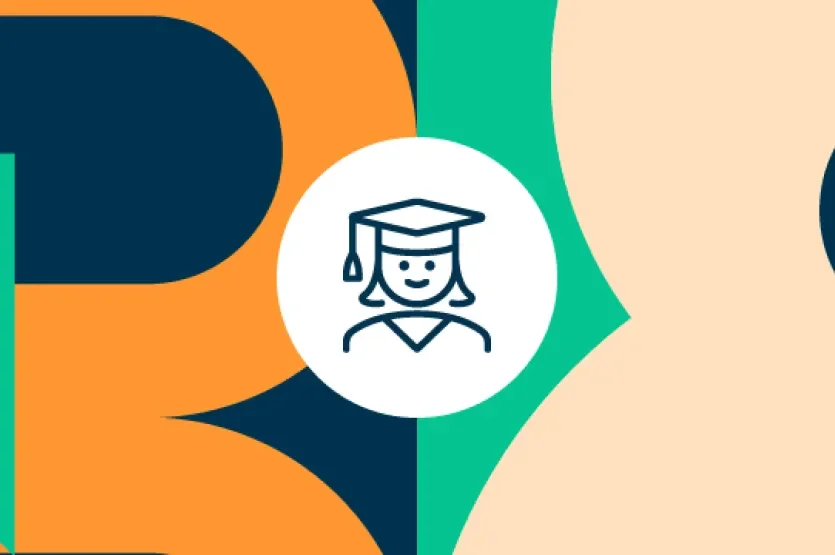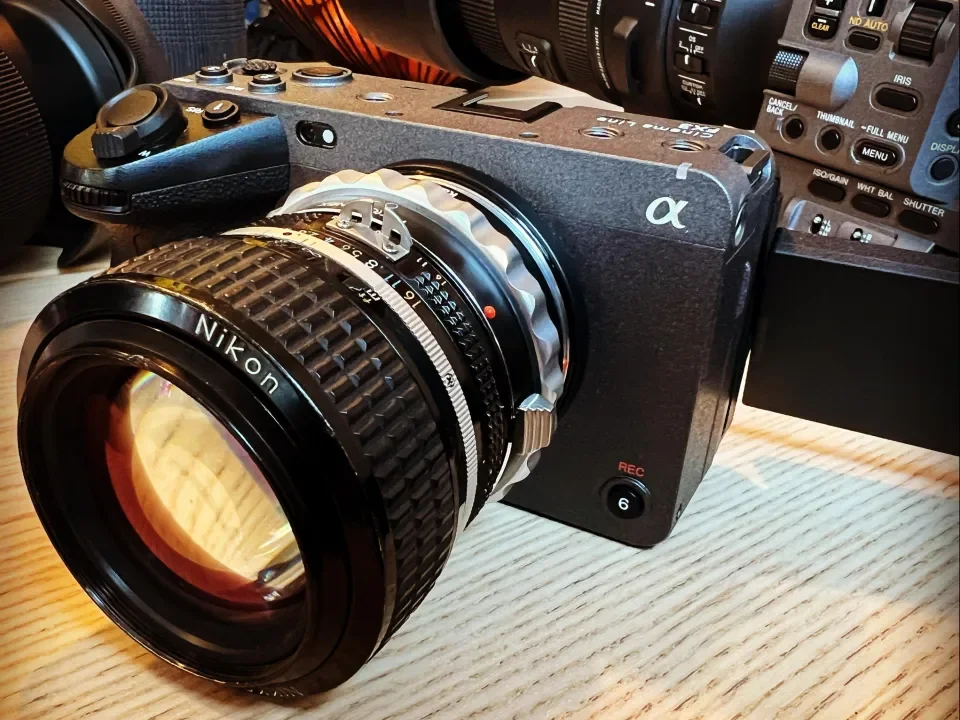Overview
The programme is all about blending contemporary emerging media production, cutting-edge research and academic thoughtfulness to foster fresh approaches that help students find exciting new ways to create, communicate and share stories.
Our students learn and create in an energetic environment, fitted with state of the art multimedia production equipment and technologies that expand creative horizons.
By delving into the latest research, which examines the deep relationship between society and technology through the investigation of digitisation, internet and media cultures and the integration of digital technologies into everyday life, students gain the skills to navigate, analyse, and actively contribute to our ever-changing media landscape and contemporary society.
This practice-based approach to learning and making provides a solid foundation for our students' learning and future in the industry.
The success of the MSc in Emerging Media contributes to DCU's School of Communications recent ranking in the top 200 communications schools worldwide, and the only Irish media/communications School ranked in the QS World University Rankings.
Why DCU
DCU People

I chose the MSc in Emerging Media as it gave me an opportunity to deepen my understanding of multimedia production and expand into new areas of practice.
Read more about Sinéad Mooney
Careers & Further Options
Careers
Graduates of this course can anticipate a variety of employment opportunities within media-related sectors. Our alumni have secured positions in diverse media enterprises, broadcasting firms and non-governmental organisations. These roles span from Online Visual Designer, Filmmaker, Editor, Interaction Designer, Animator, and UX/UI Designer to Sound Designer. Many of our graduates have advanced to take on leadership positions, including Transmedia Campaign Manager, Creative Director, or Head of Digital Production.
Entry Requirements
For admission to the MSc in Emerging Media programme, successful applicants will have:
• A degree at the level of an Irish or UK Honours undergraduate degree (H2.2 or above) or equivalent.
• Applicants with appropriate combinations of professional qualifications and experience may also be considered. This includes discipline-specific knowledge and know-how; transferable skills; basic research competency; personal effectiveness.
• Applicants who have not yet completed their degree may receive a conditional offer on the basis of most recent grades and pending the achievement of no less than a H2.2 degree.
• Recognition of Prior Learning (RPL) applicants are required to submit a cover letter along with their application under the Transcripts section of the portal, affirming their intent to apply for RPL. For more information on RPL see here.
• International candidates who are non-native speakers of English must satisfy the University of their competency in the English language.
Due to the specialist nature of this programme, additional criteria may be used to assess suitability to undertake this programme. For further information, please contact the Programme Chair using the contact details above.
Programme Structure
Students in the programme are offered from a range of production-based modules, including Responsive Media, Moving Image and Video Production, Audio and Sound Design, Emerging Media Praxis, Visual Design, and Screenwriting, as well as theory-based modules such as Understanding Social Media, Project Plan and Management, Media Audiences and Consumption.
By the end of the programme students plan and execute a Major Project in teams, supervised by staff, and designed to provide an industry-level portfolio piece.
We offer a supportive learning environment for students with diverse backgrounds and broad skills when it comes to digital media technologies and making content.
We aim to help you acquire the essential technical skills needed to use industry-standard new media tools effectively. And we're here to help you build both your creative and technical abilities in areas such as emerging media production, meaningful design, media editing, authoring, and storytelling for purposeful communication.
These skills are crucial for effectively using multimedia technologies to create content, products, services and emotions.
The interdisciplinary field of emerging media is in permanent flux, adapting to changes in society, technology, and culture. Being the first programme of its kind in Ireland, our MSc in Multimedia has kept pace with these changes for the past 25 years. Thanks to our creative approach and a team of academic staff with solid industry experience the programme has consistently provided outstanding graduates. They possess the skills, creativity, and adaptability needed to excel in various careers spanning diverse fields, from audio-visual production to project management and leadership.
Core modules:
Imaging & Visual Design
Audio & Sonic Design
Emerging Media Praxis
Understanding Social Media
Major Project
Moving Image & Video Production
Project Design & Management
Responsive Media
Options choose one:
Screenwriting
Virtual Worlds
Media Spaces
- Practice-based research: our programme stands out in how we understand and teach emerging media, in short, practice informed by critical thinking
- We create a supportive learning environment that fosters creativity that serves students' needs
- We believe in learning through practical experience, which encourages excellence, innovation, and professionalism
- We provide access to state-of-the-art technology, equipment, and facilities
- Our teaching team brings together industry experience and academic expertise
Fees and Funding
Fees
How To Apply
To apply for this programme:
-
All Applicants must apply through DCU's Student Application Portal which is available here. Here's a quick step by step guide if you need help with your application:
• Provide Academic Transcripts for each and every year of study with English translation if applicable.
• Provide a written personal statement of 500-750 (maximum) outlining your:(i) suitability for the programme;
(ii) relevant recent experience
(iii) involvements in areas specific to the programme or examples of media you admire or creators who inspire you and why this motivates you to create media.• Provide evidence of any previous media practice e.g. YouTube/ SoundCloud or links to articles online etc. (links should be uploaded on a word doc/pdf)
• If applicable, evidence of competence in the English language as per DCU entry requirements. Please see link http://www.dcu.ie/registry/english.shtml.
Application Deadlines
Applications will be accepted on a rolling basis until the programme is full or until the following dates:
- Closing date for non EU applicants is 1st July 2025.
- Closing date for EU applicants is 30th August 2025.
Note applicants who require a study visa for the purposes of studying at DCU, are advised to apply as early as possible.
All entry requirements should be met before the commencement of the programme.
Application Queries
For EU applicant queries, please visit https://www.dcu.ie/registry/eu-postgraduate-taught-admissions or email postgraduateadmissions@dcu.ie
For non EU applicant queries, please visit https://www.dcu.ie/registry/international-admissions-undergraduate-and-postgraduate or email internationaladmissions@dcu.ie
Commencement of Programme
The programme commences in September 2025.
Life On Campus
At DCU, our students can expect a unique campus experience. We are known for our excellent teaching and learning facilities, our active clubs and societies, and our great social and sporting facilities. All this makes DCU an exciting place to be.
DCU has three academic campuses; Glasnevin, St. Patrick’s and All Hallows (both in Drumcondra), all close to Dublin City centre.
They can be reached by public transport, Dublin Bus and Bus Éireann, with our Drumcondra campuses a ten minute walk from Drumcondra Train Station. Glasnevin is a 20 minute walk from St Patrick’s and All Hallows. They are also linked by Dublin Bus.
Each campus has a library (O’Reilly, Cregan and Woodlock Hall), study spaces, restaurants, and on-campus residencies. There are sports facilities on Glasnevin and St. Patrick’s, and there is a dedicated sports campus, St Claire’s, located near Glasnevin on the Ballymun Road.
DCU’s 19,000 students have access to exceptional teaching and learning facilities across our three academic campuses.
These include modern learning theatres, research centres, a new media and TV studio, radio/podcast studios, computer suites and advanced labs in the areas of Languages, Engineering, Physics, Chemistry and Biotechnology, as well as a Sports Performance centre and a training hospital ward. In 2021, we opened our first virtual reality ‘Leadership Lab’, which is located in our Business School.
We continue to improve and update our facilities. For example, construction of a new world-class STEM facility is underway on the Glasnevin campus. With capacity for an extra 3,000 STEM students, this facility will advance DCU’s international reputation for excellence in science and health, computing and engineering disciplines.
Studying in DCU isn’t just about course work. The university is rich in student life and activities.
There are more than 140 clubs and societies for students in DCU, with ‘Clubs & Socs’ days taking place on both the Glasnevin and Drumcondra campuses at the start of the academic year. They span everything from rugby to rock climbing, anime to jazz.
For many students, sport is an important part of the DCU experience. DCU’s Sports Complex boasts a 25 metre swimming pool, fitness centre gym, all-weather pitches and squash courts, as well as soccer, GAA and rugby pitches. DCU Dóchas Éireann, the university’s GAA club, is the largest third level Gaelic Games club in the country. Meanwhile, DCU Athletics has been Ireland’s highest achieving university club for many years. And DCU has dozens of other clubs to get involved in, from Archery to Weightlifting.
The Glasnevin campus is home to our purpose built, state-of-the-art student centre, The U, which serves the needs of a rapidly growing student body. Here, you will find the Student Leadership and Lifeskills Centre, performing arts and cultural spaces for students and the wider community, and the Entrepreneurship and Innovation Hub. Also located on our Glasnevin campus is The Helix, our renowned performing arts centre.
On our St Patrick’s campus, we have the Java Student Hub, a vibrant, warm and welcoming space where students can meet for coffee, play music, use the projector to watch events, or just relax. The walls of the Java Hub were designed based on the cultural history of St Patrick’s Campus, including the special references to the notable sporting history and history of the arts.
We have a number of academic, professional and social supports for students.
Student Advice & Learning Skills Centre - Offers a wide range of supports and services to students and advice
The Writing Centre - drop-in writing workshops for students through the academic year
Maths Learning Centre - provides maths support for students of all ability levels with maths modules
Student Learning - facilitate the transition from passive to active learning for students at DCU, by teaching study skills, nurturing critical thinking and building student confidence.
Careers work with students to help them on their professional journey into graduate employment.
Our student support team offers a comprehensive support programme, helping students make that all important transition into university life and focusing on building confidence and skills which are key to success at third level.

DCU Glasnevin Campus
FAQs
Is DCU all one campus?
DCU is a multi campus university - the Glasnevin, St Patrick's and All Hallows campuses. The St Patrick's campus is where the Education courses are taught and some of the subjects from the BA Joint Honours degree. There is a 20-25 minute walk between the campuses but there are buses and bikes available to go between them also.
Click here to see maps of all of our campuses
If I'm studying on the St Patrick's campus, can I use the library and sports centre on the Glasnevin campus?
Yes, all facilities such as sports and accommodation are open for all DCU students to avail of.
Are there libraries in DCU and if they have wifi and work stations?
We have a brand new state of the art four floor library on our St. Patrick's Campus which complements the existing library on the Glasnevin campus. There is free wifi, work stations as well as desktop computers.
Does DCU provide accommodation?
DCU does have on-campus accommodation for undergraduate and postgraduate students, and you can find out more and apply via the Accommodation Office webpage.








